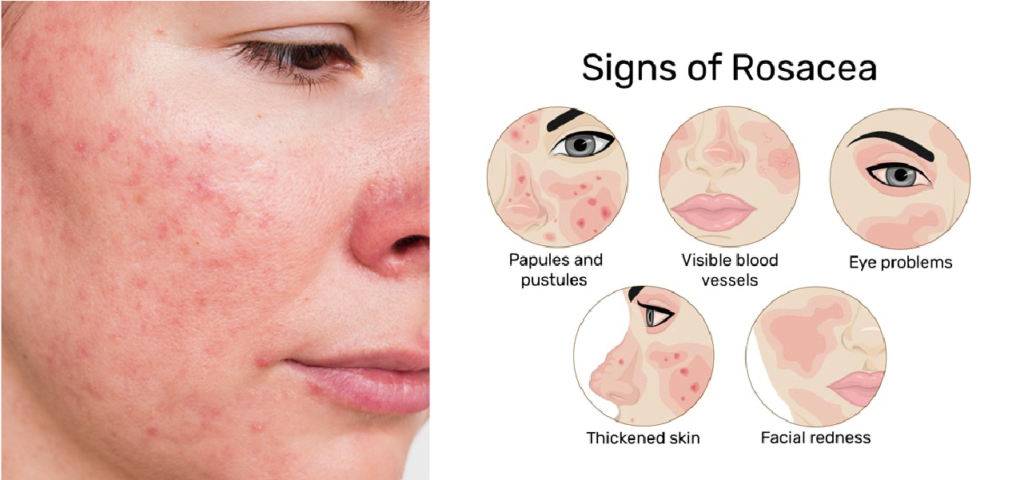Rosacea (RSC)

Rosacea (RSC): Updated Treatment Options in 2025
Overview
Rosacea (RSC) is a chronic inflammatory skin condition characterized by facial redness, flushing, visible blood vessels, and sometimes acneform bumps. It often affects the nose, cheeks, forehead, and chin, significantly impacting patients’ quality of life.
Current and Emerging Treatments
Topical Therapies
- Metronidazole, Azelaic Acid, and Ivermectin: First-line topical agents reduce inflammation, redness, and control Demodex mites associated with rosacea. Ivermectin also has strong anti-inflammatory properties.
- Minocycline Foam: A new topical antibiotic formulation that delivers targeted anti-inflammatory benefits with reduced systemic effects and improved skin penetration.
- Brimonidine and Oxymetazoline: Vasoconstrictors that reduce facial redness by constricting superficial blood vessels, providing rapid cosmetic improvement.
Oral Medications
- Doxycycline and Minocycline: Low-dose oral antibiotics with anti-inflammatory effects, prescribed for moderate to severe rosacea.
- Rifaximin: Used in selected patients with gut dysbiosis or small intestinal bacterial overgrowth (SIBO), showing promising symptom improvement through gut-skin axis modulation.
- Isotretinoin: Reserved for severe, refractory cases, especially phymatous rosacea with thickened skin.
Procedural and Light-Based Therapies
- Pulsed Dye Laser (PDL): Targets and shrinks dilated blood vessels to reduce redness and visible telangiectasia.
- KTP Laser: Effective for finer and superficial vessels, ideal for early vascular rosacea.
- Intense Pulsed Light (IPL): Addresses both redness and pigmentation, reducing inflammation and improving skin texture.
- Fractional Laser Resurfacing: For thickened or textured skin, stimulates collagen remodeling safely in rosacea-prone skin.
Future Directions
- Phosphodiesterase-4 (PDE4) Inhibitors: New anti-inflammatory topical agents showing promise in clinical trials.
- Microbiome and Gut Health Research: Increasing focus on systemic inflammation, highlighting the gut-skin axis as a therapeutic target.
Summary
Modern rosacea management uses a phenotype-directed approach combining topical and oral medications, advanced lasers, and procedural interventions. Emerging therapies promise better personalization, fewer side effects, and improved long-term control for patients.
Consult with Our Team of Experts Now!
For a tailored rosacea treatment plan using the latest evidence-based therapies, consult our dermatology specialists experienced in cutting-edge rosacea care.
References:
Del Rosso JQ, Barboza-Coronel E, Draelos ZD. Treatment Management for Rosacea: Current Pharmacological and Non-Pharmacological Options. Expert Rev Clin Pharmacol. 2025 Aug;18(8):589-605. doi:10.1080/17512433.2025.2550727. Available at: https://pubmed.ncbi.nlm.nih.gov/40836652/















